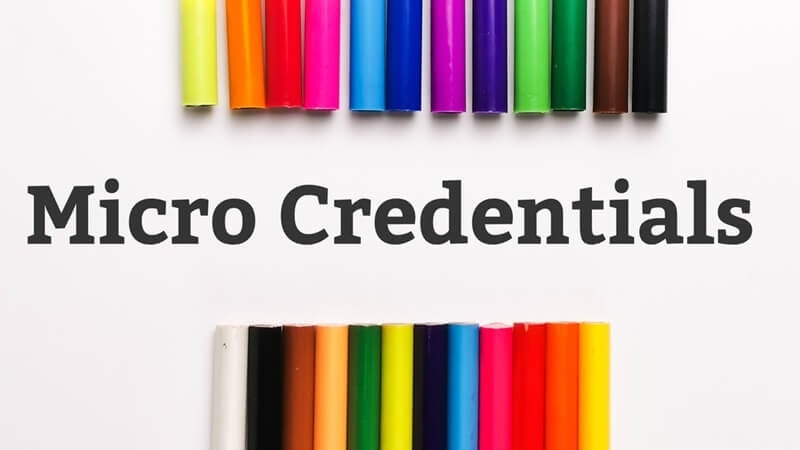
Within an increasingly dynamic economy fueled by technology, automation, and innovation that's constantly transforming industries, career-working individuals are increasingly being tasked to upskill and stay competitive. Perhaps the most far-reaching trend sweeping through the American education and career landscape today is the emergence of micro-credentials — short, targeted certifications designed to certify precise skills.
But how do they impact micro-credentials job prospects, really? What are micro-credential benefits job market policymakers talk about, and what is the micro credential vs traditional certificate conundrum for real employees? Let us find out how these brief streams of learning can make a new career direction for you.
Micro-credentials have gained tremendous speed in the American workplace. Micro-credentials are no longer trendy placeholders for degrees but an actual indication of an evolving workplace. Employers now don't care as much about what you can hang on the wall, what piece of paper you tot around with, and care more about what you can do. As jobs evolve, emerging technology, equipment, and workflows necessitate specialist skills that the traditional schooling system can't provide quickly enough.
This is where micro-credentials fit in. Micro-credentials are short, skill-based university, tech company, or online site courses that validate one's ability in an area, such as data analysis, UX design, cloud computing, or project management. Compared to years of traditional education, these are months or weeks long and are often stackable, i.e., multiple micro-credentials can be stacked to a higher qualification.
This flexibility is revolutionizing micro-credential career prospects, particularly for individuals who wish to shift careers, return to the job market, or acquire new skills for an existing career.

In order to learn about the micro-credentials career impact, it's well worth noting that employers increasingly place importance on tangible skills rather than broad qualifications. Employers may be informed by the degree that you've done in business administration, but a micro-credential in data visualisation or digital marketing conveys that you possess a tangible, workable skill.
The advantages of micro-credential benefits job market are numerous and concrete. For employers within the United States, most of them utilize micro-credentials in hiring and training their employees. Employers desire individuals who can walk into jobs having already developed skills, compared to using long onboarding practices.
Some of the most critical benefits that micro-credentials have to contribute to the job market include:
Macro-economically, the job market benefits of micro-credentials are faster workforce adjustability, higher congruence between official education and real-world needs, and more employment for skill-specialist roles.
The concept of micro-certificates for career development has been one of the largest drivers of professional development for workers in America. Micro-certification training is typically offered by established universities or corporate learning institutions for particular job functions or technologies.
Digitalization has also influenced the way achievements are presented. With digital badge career paths, professionals can now display certified evidence of skill on their online profiles, portfolios, and CVs. This helps with micro-credentials job prospects.
This shift from qualification-based to skill-based employment has created new avenues for professionals who earn and showcase digital badges continuously. Not only do they improve employability, but they also enable professionals to command greater pay by creating clear skills. Freelancers, contractors, and gig workers, especially, leverage these badges as authentic validation of the quality of their expertise, thereby helping them find more clients and projects in a reduced time frame.
In micro-credential vs traditional certificate, the one thing to remember is that they both have a defined application, are valuable, and are best utilized in a given application context. Traditional certificates usually depict a formal, longer, more comprehensive course of study. These take months or years and can include formal examinations as well as extended learning.
In contrast, micro-credentials are skill-based, short, and specialized. Micro-credentials focus on a niche topic area — e.g., learning to code in Python, mastery of a data visualization tool, or gaining a UX research certificate.
Following is an outline of micro-credential vs t-raditional certificate distinctions:
In the evolving U.S. labor market of today, the smart strategy is to do both. Use traditional education as your pillar and micro-credentials as handy instruments to update or restore that pillar throughout your work life.
The power of micro-credentials for job candidates is in alignment with business owners. American employers nowadays require employees who can easily adapt to changes, learn, and deliver quantifiable results. Micro-credentials attest to this same fact.
The synergistic value of certified competences, experiential competences, and even wider professional networks tremendously improves micro-credentials job prospects in every profession.
The future career impact of micro-credentials will be even stronger with learning going modular, verifiable, and stackable. The individuals who master this new paradigm for learning will have improved, more adaptable, and more durable careers.
By embracing micro-certificates to facilitate career development and digital badges to demarcate job prospects, workers can move towards new needs, pursue better prospects, and express experiential capability that organizations look for. Micro-credential vs. traditional certificate is not a battle of replacement but of expansion — how both might complement each other and forge well-rounded, visionary professionals.
In the longer term, the future of micro-credentials job prospects is bright. Micro-credentials enable you to remain up-to-date, competitive, and work-ready in the dynamic business landscape of today. Micro-credentials predict an end to degrees for learning and a move towards life for learning — an era when education ceases to be what you know but what you can do.
This content was created by AI